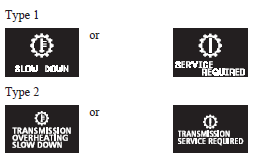
Mitsubishi Lancer Owners Manual
When a malfunction occurs in the CVTStarting and driving / Automatic transmission INVECS-III Sports Mode 6CVT (Intelligent & Innovative
Vehicle Electronic Control System III) / When a malfunction occurs in the CVT

There could be a system malfunction if the
 warning display or the
warning display or the
 warning display is displayed
warning display is displayed
![]()
► If malfunction occurs in the CVT while driving, the
 warning display or the
warning display or the
 warning display will appear
warning display will appear
In this case, follow these procedures:
[When ![Mitsubishi Lancer: When a malfunction occurs in the CVT Mitsubishi Lancer: When a malfunction occurs in the CVT. is showing]](images/pages/5/index.53.gif) warning display
warning display
The CVT fluid is overheating. The engine control may activate to lower the CVT fluid
temperature, causing the engine revolutions and vehicle speed to decrease. In this
case, take one of the following measures.
• Slow down your vehicle.
• Stop the vehicle in a safe place, place the selector lever in the “P” (PARK) position,
and open the bonnet with the engine running to allow the engine to cool down.
After a while, confirm that the  warning display is no longer
warning display is no longer
[When ![Mitsubishi Lancer: When a malfunction occurs in the CVT Mitsubishi Lancer: When a malfunction occurs in the CVT. is showing]](images/pages/5/index.53.gif) warning display
warning display
It may be that there is something unusual happening in the CVT, causing a safety
device to activate. We recommend you to have your vehicle inspected as soon as possible.
► Before selecting a position with the engine running and the vehicle stationary,
fully depress the brake pedal to prevent the vehicle from creeping.
The vehicle will begin to move as soon as the CVT is engaged, especially when the
engine speed is high, at fast idle or with the air conditioning operating, the brakes
should only be released when you are ready to drive away.
► Depress the brake pedal with the right foot at all times.
Using the left foot could cause driver movement delay in case of an emergency.
► To prevent sudden acceleration, never race the engine when shifting from the “P”
(PARK) or “N” (NEUTRAL) position.
► Operating the accelerator pedal while the other foot is resting on the brake pedal
will affect braking efficiency and may cause premature wear of brake pads.
► Use the selector lever in the correct shift position in accordance with driving
conditions.
Never coast downhill backward with the selector lever in the “D” (DRIVE) or sports
mode position or coast forward with the selector lever in the “R” (REVERSE) position.
The engine may stop and the unexpected increase in brake pedal effort and steering
wheel weight could lead to an accident.
► Do not race the engine with brake pedal pressed when the vehicle is stationary.
This can damage the CVT.
Also, when you depress the accelerator pedal while holding down the brake pedal
with the selector lever in the “D” (DRIVE) position, the engine revolutions may
not rise as high as when performing the same operation with the selector lever in
the “N” (NEUTRAL) position.
Passing acceleration
To gain extra acceleration in “D” (DRIVE) position, push the accelerator to the floor. The CVT will automatically downshift.
![]() Note
Note
► In “Sports mode”, downshifts do not take place when the accelerator is depressed all the way to the floor.
Uphill/downhill driving
DRIVING UPHILL
The CVT may not upshift to a higher shift position if the computer determines the current speed cannot be maintained once a higher shift position is engaged.
For smoother vehicle performance, if you release the throttle while climbing a steep grade, the CVT may not upshift. This is normal, as the computer is temporarily preventing shifting. After reaching the top of the hill, normal shift function will resume.
DRIVING DOWNHIL
When travelling down steep grades, the computer may automatically select a lower shift position.
This function assists engine braking efforts, reducing the need for using the service brakes.
Waiting
For short waiting periods, such as at traffic signals the vehicle can be left in selector lever position and held stationary with the service brake.
For longer waiting periods with the engine running, place the selector lever in the “N” (NEUTRAL) position and apply the parking brake, while holding the vehicle stationary with the service brake.
![]()
► Never hold the vehicle stationary while the CVT is engaged on a hill with the accelerator, always apply the parking brake and/or service brake.
Parking
To park the vehicle, first bring it to a complete stop, fully engage the parking brake, and then move the selector lever to the “P” (PARK) position.
If you are going to leave the vehicle unattended, always switch off the engine and carry the key.
![]() Note
Note
► On a slope, be sure to apply the parking brake before moving the selector lever to the “P” (PARK) position. If you move the selector lever to the “P” (PARK) position before applying the parking brake, it may be difficult to disengage the selector lever from the “P” (PARK) position when next you drive the vehicle, requiring application of a strong force to the selector lever to move from the “P” (PARK) position.
When the CVT makes no speed change
If the transmission does not change speeds while driving, or your vehicle does not pick up enough speed when starting on an uphill slope, it may be that there is something unusual happening in the transmission, causing a safety device to activate.
We recommend you to have your vehicle checked as soon as possible.






